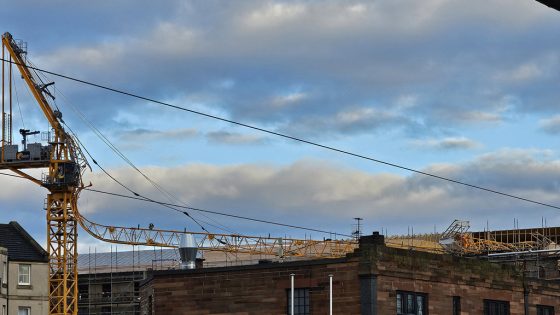An employment tribunal has ordered a crane supplier to pay a former employee almost £30,000 for unfair dismissal after the crane he was operating collapsed.
The crane operator, named as G Shields in a tribunal judgment released this week, was dismissed by Falcon Tower Crane Services after the jib collapsed on a site in Stead’s Place in Edinburgh (pictured), on 28 November 2023.
Employment judge Amanda Jones ruled the claimant was unfairly dismissed last year following the incident.
Norfolk-based Falcon was ordered to pay the claimant a basic award of £18,550 and a compensatory award of £10,665.68 net, the latter made up of notice pay of £10,165.68 and £500 in respect of loss of statutory rights.
Falcon had alleged that Shields’ dismissal was by reason of misconduct and that a fair procedure had been followed.
The court heard that Falcon had reached the conclusion that the claimant had been aware of damage to the crane and made a conscious decision to go ahead and use it without reporting the damage.
However, Judge Jones found that Falcon had not carried out a “sufficient investigation to permit them to reasonably come to that view”.
“The conclusions reached were all based on conjecture and hypothesis, none of which was ever investigated or even put to the claimant to allow him to comment on it,” the judge said.
“There was no effort to investigate anything the claimant said. There was no effort to establish any evidence which might support the claimant’s position.”
The father of two, from Glasgow, had been employed by Falcon for over 20 years until his dismissal on 23 August 2024, and was described by the court as one of its “most experienced” crane operators.
At the time of the incident, he was operating a Jaso J380PA crane that had a tower height of 21 metres and a jib length of 65 metres on a site that was being managed by contractor Collab Construction Ltd.
“The claimant heard an unusual noise during the course of 27 November when operating the crane but was not unduly concerned about it,” the judge said.
“The claimant placed the crane in the out-of-service position at some time after 4pm on 27 November when it was getting dark. He was not aware that damage may have been caused to the crane when operating that device.”
The next day, on entering the site, Shields met the crane supervisor, named as Mr Waddle, and informed him he would need around 15 minutes to carry out checks before starting lifts.
The court heard Falcon alleged he was aware of the damage and was colluding with the supervisor to cover it up but the judge said this was “entirely unlikely”.
“[Falcon’s health and safety manager] Mr Rix’s view appeared to believe that Mr Waddle and the claimant had conspired to agree how they would continue to operate on site with the damaged crane and not report damage,” the judge said.
“It was suggested that this discussion took place in a call which took place around the time when the damage was likely to have occurred and lasted just over a minute.
“It seemed entirely unlikely that a discussion about damage to a crane and what steps might be taken to conceal that damage between two people on the phone could take just over a minute.”
Shields said he had climbed to the top platform to take a picture of Edinburgh Castle for his daughter.
But the court heard Falcon alleged this was to inspect damage he believed was there.
“Mr Rix concluded that the claimant had gone to the third platform to inspect the damage he knew was there.
“The claimant gave an alternative explanation, and Mr Rix did not explore this further by, for instance, asking to see the photograph the claimant said he had taken,” the judge said.
“The claimant did not see any damage to the crane while he was carrying out his inspections on 28 November.
“Had he done so, he would have reported the damage to the respondent and not operated the crane.
“He knew that operating a damaged crane could risk his life and that of all other individuals on the site. If the claimant reported any damage to a crane, he would continue to be paid while any damage was repaired.”
Shields began work, and on the third lift he carried out, the jib of the crane collapsed.
He suffered an injury to his shoulder at the time and was taken to hospital.
Shields has subsequently been diagnosed with post-traumatic stress disorder, and experiences flashbacks and nightmares, the tribunal said.
He has also developed a fear of heights and has not worked since.

